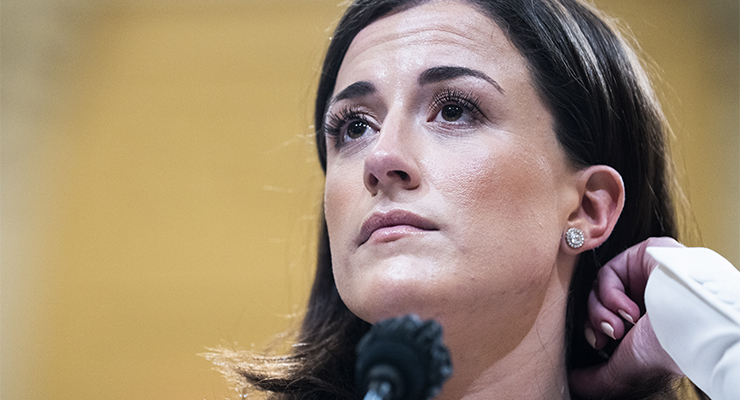
When it comes to the ability of the system to hold Donald Trump accountable for lawlessness before, during and after his presidency, it’s been one disappointment after another.
First, his lawyer Michael Cohen goes to federal prison for paying Stormy Daniels and another of Trump’s sex partners to keep quiet in the lead-up to the 2016 presidential poll. Yet the case against the then president — who was referred to throughout Cohen’s proceedings as an unindicted co-conspirator — was dropped because a sitting president can’t be indicted.
In 2021, Trump’s justices at the Supreme Court (his way of referring to them, not mine) dismissed two emoluments or foreign bribery suits as moot because — wait for it — Trump was no longer president. Even the tax evasion scheme that led both the Trump organisation and its CFO to be charged has not touched Trump, and the bank and tax fraud investigation against him was abruptly discontinued in March when a new district attorney expressed doubt that the numerous felony violations could be proved beyond a reasonable doubt.
At the heart of these problems is Trump’s state of mind, an essential element to proving a crime.
During the Watergate hearings this question was phrased as: “What did the president know, and when did he know it?” But discerning Trump’s comprehension of and culpability for his conspiracies is more complicated. Not just because he’s refusing to testify to the committee, but because he talks like a mobster and doesn’t use email or text. Not to mention a personality disorder that seems to impede his grip on reality wherever his ego is concerned.
Which is where Cassidy Hutchinson, the surprise witness for yesterday’s unexpected presentation from the January 6 committee, comes in.
Because Hutchinson was senior aide to the chief of staff Mark Meadows, she was up close and personal with the president and the senior staff around him in the lead-up to January 6 and on the day. In the absence of other witnesses such as White House counsel Pat Cipollone coming forward, her testimony — and footage from a documentary filmmaker who interviewed and followed Trump around in the six weeks before the riot — is critical to shed light on Trump’s comprehension, purpose and state of mind in the lead-up and on the day.
But why the urgency? Deputy chair of the committee Republican Liz Cheney offered a clue.
“Our committee commonly asks witnesses … whether they’ve been contacted by any of their former colleagues or anyone else who attempted to influence or impact their testimony … This is a call received by one of our witnesses: ‘A person let me know you have your deposition tomorrow. He wants me to let you know he’s thinking about you. He knows you’re loyal and you’re going to do the right thing when you go in for your deposition.’ “
Was this indirect threat from Trump towards Hutchinson? We don’t know, although the devastating impact of her testimony for him and Meadows was clear as she related attempt after attempt to get the president to recognise and do something about the coming threat to no avail.
Most chilling was her recounting of Trump’s response, which he gave more than once, to what he was repeatedly being told was the heavily armed nature of the rioters he was planning to unleash on congressional members and staff.
“I was in the vicinity of a conversation where I overheard the president say something to the effect of, ‘You know, I — I don’t fucking care that they have weapons. They’re not here to hurt me … They can march to the Capitol from here’.”
The take-home of yesterday’s hearing is clear. Trump didn’t call off the white supremacist leaders of the mob when they led a chant about hanging his vice-president because, according to another conversation overheard by Hutchinson, he thought “Mike deserves it” and he didn’t think the mob was “doing anything wrong”.
Trump didn’t act to calm or turn away the rioters because for him the violence at the Capitol that day was a feature, not a bug.
In the face of Pence’s refusal to use the certification process to throw the presidency Trump’s way, it was Trump’s last-ditch attempt to stop the certification process that would confirm Joe Biden as the next president of the United States.








2016 “The walls are gonna close in on Trump soon”
2017 “Okay, the walls are really closing in..”
2018 “The walls are undeniably closing in..”
2019 “The walls are truly, rooly closing in..”
2020 “How about those walls!”
2021 “Nothing but walls in every direction”
2022 “Wow, walls be closing!”
Problem was – He didn’t build the wall
Love this!
The case “…was dropped because a sitting president can’t be indicted.”
This is repeated often as though it was written in the constitution or was beyond dispute for some other reason. In fact it is merely an opinion of a White House lawyer in a previous administration, who worked for the then president and was therefore rather likely to provide advice that suited the president. It’s never been tested. As things stand it would be the Supreme Court that settles the question.
It’s fair to say that the current Supreme Court would always provide a decision that helps the Republicans, so maybe that’s a moot point. But the decision not to indict Trump back then was still cowardice (or, more charitably, prudence) that prevented an indictment and not a consequence of having no choice.
Yes true. I had written that but b/c of word count, we cut it. But absolutely, it’s untested and seems totally suspect to me.
Hi Leslie, thanks for the article which nicely sets out the current state of this mind boggling story, but I have to say I am flabbergasted that word count is a thing in an online article. Can you elucidate for our delectation?
My guess is that the word count for an article is limited because (take your pick)
One may be amazed that Trump is still free and alive. The USA is so degraded, ignorant, righteous, confused. Jail? How about a century or two? Stories of his filth and cheating abounded long ago…
Only in America. Blow the whistle on corrupt activities and you’re likely to end up in Guantanamo Bay, yet Trump consistently gets away with things that a common man would most likely find them ending up in Jail.
Blow the whistle on corruption and end up seeking political asylum in an embassy.
But isn’t that what we Australians are facing here in Oz with whisttleblowers being tried in secrecy, no details of the charges known and the prospect of prison for speaking out about our own countrys bugging of Timor government – Berbard Colleary and Witness K..
Trump ‘gets away ‘ because there is no evidence produced that can be restated in a Court of Law.
It happens all the time in here in Australia but only against ALP leadership. (From the Murdoch press, who else ?)
If US voters – & women in particular – were not disenchanted with video of Trump bragging of “just grab ’em by the pvssy” one wonders what else it may take to reveal the depth of his narcissism & amoral character.
As viewers of Fox News aren’t being exposed to these extraordinary hearings the impact of evidence is not targeting his deluded disciples.
Exactly, and compare the website of Fox News with other actual media organisations and the headlines are all the usual anti-left culture war crap. Almost nothing about Jan 6 and Hutchinson. Fox News is treacherous, treasonous and anti-patriotic
It would be great if Trump and Murdoch shared a cell for a few years at least, that would be poetic justice..!!
The U.S. Constitution explains how a president can be removed from office for “high crimes and misdemeanors” by Congress using the impeachment process. But the Constitution is silent on whether a president can face criminal prosecution in court, and the U.S. Supreme Court has not directly addressed the question.
Nixon v. Fitzgerald is a case from 1982 where A. Earnest Fitzgerald brought a lawsuit against several government officials, including President Richard Nixon. The Supreme Court decided that presidents are not immune to criminal charges while in office.
In 1997, the Supreme Court heard Clinton v. Jones, which determined a sitting president could not be sued in a civil suit for official actions until the conclusion of their term.